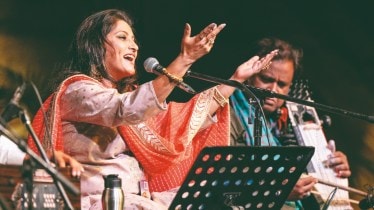When you ask Smita Rao Bellur of any regrets about leaving a cushy corporate job for her quest for Sufi music, the qawwal responds with a resounding “no”. “You can make a bank balance out of the job in software, but the creative satisfaction is here,” says Bellur, an engineer who pursued a work-integrated programme at BITS Pilani and went on to work at companies like SAP Labs and Oracle.
And as this singer, who started learning Sufi music only in 2009, performed at this year’s Rajasthan International Folk Festival in Jodhpur, popularly known as Jodhpur RIFF, last month, one could easily fathom why there weren’t any regrets in making that life-changing shift. As Bellur sang one kalam after another, ranging from Kabir’s doha —Ghat ghat mein panchi bolta to the ever-popular Mann kunto maula and Nit khair manga, the audiences, too, shifted from listening in utter silence to breaking into applause.
She stood out when she sang, It bahe Ganga, ut bahe jamuna; beech mein thado Shyam re; nirdhan ki naiya paar kara do; tumhro Mohammed naam re, by a Hyderabadi poet. “In India, Hindustan, Bharat — whatever you call it — one needs to understand we are nothing without one another. One also needs to understand that this communal hokum and othering happening in the country is a constricted way of thinking,” she says, highlighting India’s much-revered Ganga-Jamuni tehzeeb while drawing parallels between the Bhakti movement and the Sufi order.
While Bellur, hailing from northern Karnataka, was trained in Hindustani classical music since childhood, it was only in 2009 that her journey into Sufi singing began. It was “adversity” that steered her towards Sufism in general and Qawwali in particular. “I heard a Sufi song, which shifted the plane completely. I realised there was something deeper in music, which put me into a trance, and I was there in that state for a long time,” she says. Hence, her training began. She started learning Sufism under Professor Ejasuddin, before learning Qawwali from Hyderabad’s much-revered Warsi brothers.
And that passion seems to have borne fruit. Not only is she a regular at music festivals and such events, she rendered her voice in the Netflix series Yeh Kaali Kaali Ankhein, as she sang the popular Humri ateriya.
Although Abida Parveen, Pakistan’s popular qawwal, is a pioneer in bringing the spotlight on women singers in Sufi music, the field is still dominated by men. “She is a paradigm-shifter, a pioneer. However, in India, I see more number of non-Muslim women Sufi kalam singers than Muslim ones. It might be because there is a bit of hesitation on the part of their parents and society. There are male qawwals who don’t teach their daughters to perform, even though they might know the kalam and how to sing,” she says, adding that she would love to see more women coming forth and singing, as “spirituality is for everyone”.
While Bellur is a rising star in the field of Qawwali, income can still be a concern. “It is tough. There is no guarantee of pay,” she says, specifying that along with the government, corporates should also step up to support music and musicians. “Most of the artistes have day jobs. And when you have a day job, the art can get diluted. Also, if a female musician has to survive just on music, she could have
to make some very tricky decisions,” she highlights.
Bellur also mentions the increasing importance of presentation on stage, how one needs to “look a certain way, dress a certain way”. “That’s the pressure in today’s industry — on women,” she says.
Despite that, women are making a mark, such as the Nooran sisters and Roohani sisters. For Bellur, she thinks she still has a lot to do. “I’m still a learner,” she adds.
